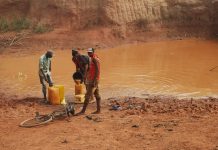By maryam diallo
African Environmental Leaders Urge AU Action: Call for Continent-Wide Ban on Single-Use Plastics Inspired by Lagos State Success

In a significant move, Dr. Suleyman Musa Tanko, National President of the Africa Institute of Waste Management and Environmental Studies (FAIWMES), has called upon the African Union (AU) to rally its member nations in adopting a continental-wide ban on single-use plastics. This appeal comes in light of Lagos State, Nigeria’s successful efforts to curb environmental degradation through similar measures.

The FAIWMES endorsement of Lagos State’s proposal to outlaw single-use plastic “take away” items is commendable. This progressive step supports the African Union’s potential implementation of a continent-wide ban, with a focus on advocating for a nationwide ban within Nigeria.
The president stated this in reponse to the mervelous effort of lagos state government toward banning single use plastic
The environmental benefits of such a ban are manifold, including reduced pollution, wildlife protection, and the promotion of eco-friendly waste management practices. AIWMES is actively involved in promoting and implementing reusable and biodegradable materials as alternatives to single-use plastics. Furthermore, the institute emphasizes the importance of public education campaigns to raise awareness about the harmful effects of plastic pollution and the advantages of sustainable practices.
Despite the potential positive impact, concerns persist regarding microplastics, which can harm marine life and disrupt ecosystems. Dr. Suliaman Musa Tanko, AIWMES President, advocates for stricter laws governing the manufacture, use, and disposal of plastics. His comprehensive strategy includes enforcing sanctions for non-compliance, supporting recycling facilities, and even proposing an outright prohibition on single-use plastics.
Dr. Tanko’s proposal aligns with international efforts, such as the COP28 agenda, and seeks to position Nigeria and the ECOWAS region as leaders in combating plastic pollution. He believes that a total ban on single-use plastics would be a more effective way to mitigate environmental damage, emphasizing the importance of sustainable practices over economic measures.
Referencing nations like Rwanda, known for its successful enforcement of stringent environmental regulations, Dr. Tanko underscores the benefits of proactive environmental conservation. Rwanda’s commitment to sustainability has resulted in improved cleanliness, reduced plastic pollution, and heightened awareness of environmental stewardship.
The suggestion to learn from Rwanda implies a need for Nigeria and the ECOWAS region to prioritize eco-friendly alternatives, waste reduction, and sustainable development. This may involve investments in green technologies, support for recycling programs, and a societal shift towards valuing environmental preservation.


















